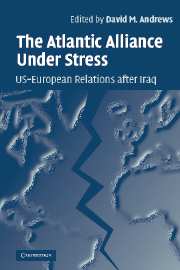Book contents
- Frontmatter
- Contents
- List of contributors
- Preface
- Introduction
- I The Iraq War and the Atlantic alliance
- II National policies within the Alliance
- 4 US politics and transatlantic relations: we are all Europeans now
- 5 Three rifts, two reconciliations: Franco-American relations during the Fifth Republic
- 6 Security exporters: Germany, the United States, and transatlantic cooperation
- 7 A bridge too far: the United Kingdom and the transatlantic relationship
- 8 The richest and farthest master is always best: US–Italian relations in historical perspective
- III Prospects for the Alliance
- References
- Index
4 - US politics and transatlantic relations: we are all Europeans now
Published online by Cambridge University Press: 22 September 2009
- Frontmatter
- Contents
- List of contributors
- Preface
- Introduction
- I The Iraq War and the Atlantic alliance
- II National policies within the Alliance
- 4 US politics and transatlantic relations: we are all Europeans now
- 5 Three rifts, two reconciliations: Franco-American relations during the Fifth Republic
- 6 Security exporters: Germany, the United States, and transatlantic cooperation
- 7 A bridge too far: the United Kingdom and the transatlantic relationship
- 8 The richest and farthest master is always best: US–Italian relations in historical perspective
- III Prospects for the Alliance
- References
- Index
Summary
Forty years ago, at the height of the Cold War, a popular and sophisticated president was in the White House. The French ambassador commented at the time, “Never before have the misunderstandings between France and the United States been as profound.” American escalation of the war in Vietnam two years later produced judgments in Europe as harsh as any heard during the Iraq War. President Lyndon Johnson was considered by nearly one-third of the French population as the “most dangerous threat to peace”; the president of France, Charles de Gaulle, labeled Johnson “the greatest danger in the world today to peace.” Similar levels of distrust and anxiety could be found at other times in the half-century of the Atlantic alliance. Given this history of sharp conflict and multiple misunderstandings, how does the current transatlantic crisis differ?
Many explanations for the pattern of transatlantic relations rely on the international environment or changes in relative power to explain oscillation between cooperation and conflict. For those on either side of the Atlantic who view the current post-Iraq conflict between the United States and Europe as unprecedented, two such changes are awarded a central place. The end of the Cold War was the source of many premature predictions of NATO's demise, on the basis of a simple, realist explanation for alliances: end of Soviet threat, end of alliance. Now the absence of a common threat and, more important, divergent strategies for meeting agreed threats appear to signal a deeper level of discord.
- Type
- Chapter
- Information
- The Atlantic Alliance Under StressUS-European Relations after Iraq, pp. 81 - 101Publisher: Cambridge University PressPrint publication year: 2005
- 1
- Cited by



